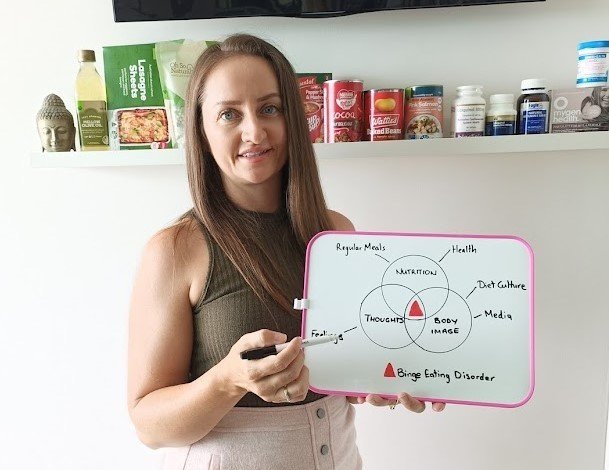What to Expect in Your First Dietitian Appointment
If you’re considering seeing a dietitian for the first time, you might be feeling unsure or even a bit nervous. That’s completely normal! The goal in our first meeting is to provide a safe, non-judgmental space where we can explore your unique needs and goals together.
What will the dietitian ask me?
Will the dietitian judge me for my eating habits?
How long will the appointment take?
What if I can’t follow the recommendations?
These are just a few questions you might be pondering before you step inside the virtual clinic at Dietility. Read on so I can shed some light on those uncomfortable fight-or-flight thoughts.
1: Getting to Know You (the discovery phase)
In our first session, I’ll be gathering a lot of information to better understand your story, your health background and how thing currently are. Depending on the reason you are here, some of the key areas we’ll cover are:
Current eating habits: Your usual meals, snacks and beverages
Medical History: Any current diagnoses, health conditions or medications you’re taking
Supplements: Whether you’re taking vitamins, minerals or other dietary supplements
Appetite and energy: How your appetite fluctuates and if you experience fatigue or low energy during the day
Gut symptoms: Any issues with digestion, bloating or bowel movements
Lifestyle factors: Sleep patterns, stress levels and physical activity
Food shopping and preparation: Who handles the shopping and cooking at home and how that impacts your choices
Relationship with food: Whether you have any emotional eating patterns or other thoughts and feelings around food
Discussing Body Weight
When it comes to discussing weight, it’s important to know that our focus is always on health, not a number on the scale. Weighing is not a normal part of my practice.
The only exception on discussing weight are in cases where it’s relevant to your health or recovery goals. For example, if weight restoration is necessary to ensure medical stability, we’ll approach it with empathy and in a way that prioritises your overall well-being. The goal is to help you feel supported in all aspects of your health.
2. Finding Your Focus (defining what matters to you)
With a clearer picture of your story, we’ll work together to identify what you want to achieve. Your goals might look like:
Establish regular eating: Establishing consistent meal times with a goal of eating three meals and two snacks per day to reduce binge episodes
Blood glucose management: Building more balance into my meals by including a source of lean protein, low-GI carbs and healthy fats at each meal for sustained energy and to reduce my HbA1c to within my GPs recommendation
Emotion regulation: To build awareness of my emotions and learn and implement skills to effectively manage them without food
As we move forward, we’ll measure your progress against these initial goals. One of the most rewarding parts of working together is looking back at where you started and seeing just how much you’ve grown. Reflecting on those early baseline measures can be a powerful reminder of the changes you’ve achieved — both big and small.
3. Crafting Your Game Plan (building your personalised plan)
This is the exciting part! It’s where we start to explore what’s possible and figure out the best next steps for you. The goal here isn’t to overwhelm you with a laundry list of changes but to find one or two small, meaningful shifts that feel doable in your life right now.
So, what might this look like?
Nutritional counselling: A collaborative and holistic approach to empower you to make informed choices and build a healthier relationship with food
Realistic strategy development: Together, we’ll come up with practical strategies like
how to build a balanced meal that’s satisfying and to your preferences
planning ahead for busy days
improving appetite by increasing nutrition slowly while managing gut discomfort
refining food options bit-by-bit without dramatically changing the taste, texture and enjoyment — not a complete overhaul of everything at once
Nutrition education: You may have received a new medical diagnosis such as PCOS and need to understand how diet plays a role in its management
Motivational interviewing: We’ll dig into what really drives you and how you can stay connected to your goals, even when you feel like things are holding you back
Hands-on activities: To make it all stick, we can map out the “how to” so you really are clear on execution part of change, do some reflective exercises or try a fun activity like mindful eating
This isn’t about aiming for perfection, but finding what feels right and achievable for you. Remember, change happens one step at a time, and even small shifts can create big momentum over time.
4. Setting You Up for Success (building momentum)
Before we wrap up, it’s important to talk about what comes next. Behaviour change isn’t a one-and-done scenario—it takes time, patience, and ongoing support.
As you start trying out the strategies we’ve developed, there might be times when things don’t go as planned or certain changes feel harder to implement. And that’s okay! When this happens, it’s actually an opportunity to learn more about the barriers you’re facing and find new ways forward.
In our follow-up sessions, we’ll reflect on what’s working and what’s not. This isn’t about judgement, but about understanding your experience and using that insight to adjust your plan.
Sometimes the smallest tweaks can make a huge difference, and reflection helps us figure out what needs to shift to keep you moving in the right direction.
Ready to Get Started?
If you’re curious about how working with a dietitian could help you reach your goals, I’d love to chat. Book your first appointment today, and let’s take the first step together towards a healthier, happier relationship with food. Otherwise, give us a call to see if we are the right team for you!




